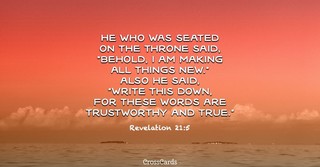
- Recent Translations
- All Translations
Hisgalus 21:2
Share
Settings
Images for Hisgalus 21:2

Hisgalus 21:2 Meaning and Commentary
And I John saw the holy city
The same with the beloved city in ( Revelation 20:9 ) the church of God: sometimes the church militant is called a city, of which the saints are now fellow citizens, governed by wholesome laws, and enjoying many privileges; but here the general assembly and church of the firstborn, or all the elect of God, are intended, the whole body and society of them, being as a city, compact together; called holy, not only because set apart to holiness by God the Father, and their sins expiated by the blood of Christ, or because he is made sanctification to them, or because internally sanctified by the Spirit of God, which now is but in part; but because they will be perfectly holy in themselves, without the being of sin in them, or any spot of it on them: and John, for the more strong ascertaining the truth of this vision, expresses his name, who saw it, to whom God sent his angel, and signified to him by these Apocalyptic visions what should be hereafter; though the name is left out in the Alexandrian copy, and in the Syriac, Arabic, and Ethiopic versions:
new Jerusalem;
the church of God, both in the Old and New Testament, is often called Jerusalem, to which its name, which signifies the vision of peace, agrees; it was the city of the great King, whither the tribes went up to worship; it was a free city, and a fortified one: the Gospel church state in its imperfection is called the heavenly Jerusalem, and the Jerusalem above, which is free, and the mother of all; and here the church in its perfect state is called the new Jerusalem, where will be complete peace and prosperity; and which is called new, because it has its seat in the new heaven and new earth: the inhabitants of which will appear in their new and shining robes of immortality and glory; and to distinguish it from the old Jerusalem, and even from the former state of the church; for this will be (hatylt) "the third time" that Jerusalem will be built, as say the Jews, namely, in the time of the King Messiah {r}:
coming down from God out of heaven;
which designs not the spiritual and heavenly original of the saints, being born from above, on which account the church is called the heavenly Jerusalem; but a local descent of all the saints with Christ from the third heaven into the air, where they will be met by living saints; and their bodies being raised and united to their souls, they will reign with Christ in the new earth: and this is
``the building which the Jews say God will prepare for the Jerusalem which is above, (atxnl) , "to descend into" F19:''prepared as a bride adorned for her husband;
Christ is the husband, or bridegroom, and the church is his spouse, and bride; and in these characters they will both appear at this time, when the marriage between them will be consummated: and the church may be said to be prepared as such, when all the elect of God are gathered in, the number of the saints is perfected; when the good work of grace is finished in them all, and they are all arrayed in the righteousness of Christ: and to be "adorned", when not only they are clothed with the robe of righteousness, and garments of salvation, and are beautified with the graces of the Spirit, but also with the bright robes of immortality and glory. The phrase is Jewish, and is to be read exactly as here in the book of Zohar F20.
F18 Zohar in Gen. fol. 126. 4.
F19 Ib. fol. 103. 4.
F20 Zohar in Gen. fol. 53. 2.